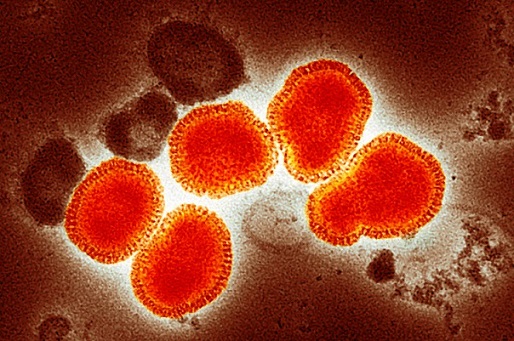BREAKING! New Mutant H3N2 Flu Virus Strain With 7 Genetic Changes Could Unleash Deadliest Global Flu Wave in Decades!
Nikhil Prasad Fact checked by:Thailand Medical News Team Nov 11, 2025 3 months, 17 hours, 45 minutes ago
Medical News: Global Fears Rise Over New Flu Mutation
Health experts are sounding the alarm over a newly mutated strain of the H3N2 influenza virus that has already begun spreading rapidly across several countries, sparking fears of the worst flu season in more than ten years. This variant, which carries seven distinct genetic mutations, has been linked to unusually severe cases in both Japan and the United Kingdom, and epidemiologists warn that it could sweep globally within weeks. Already, hospitals in parts of Asia and Europe are reporting a surge in flu-related hospitalizations, particularly among older adults and those with weakened immune systems. Death rates are already rising despite the fact that governments and health officials around the world are trying to downplay the situation and the threat. Preliminary studies that have yet to be published show that these newer H3N2 strains are more neurotrophic and also exhibit tropism towards the tissues in the gastrointestinal tract. With many already having immune dysfunction or immunodeficiency issues due to previous exposure to the SARS-CoV-2 virus or the COVID-19 mRNA vaccines, this new flu strain poses a serious global health threat. To make things even more concerning, experts warn that is new strain is extremely “volatile” in terms of evolutionary behavior and is still mutating. With H5N1 also in circulation, we have a “ticking time bomb” should reassortant events occur! Governments and health officials around the world are trying to downplay or conceal the emerging threat.

Experts fear the newly mutated H3N2 flu strain could trigger the deadliest
global influenza season in years
According to Dr. Antonia Ho from the University of Glasgow and Professor Nicola Lewis of the World Influenza Centre at the Francis Crick Institute, the mutated strain has surfaced earlier than expected and appears to be far more transmissible than typical seasonal flu viruses. In this
Medical News report, experts reveal that this new H3N2 subtype is not only more contagious but also partially resistant to the immunity developed through previous infections and vaccinations.
Why The Mutant H3N2 Strain Is More Dangerous
The H3N2 influenza virus has historically been more severe than the H1N1 strain, but this new variant appears even more aggressive. Scientists from the University of Cambridge and the University of Oxford confirm that these seven mutations—detected as early as June—have enhanced the virus’s ability to evade antibodies and replicate efficiently in human cells. The strain’s reproduction number (R-value) has risen from 1.2 to 1.4, meaning that every 100 infected individuals could spread it to about 140 others, compared to 120 in typical flu seasons.
This faster transmission, coupled with the virus’s earlier appearance—about five weeks before the usual flu peak—means fewer people have been vaccinated in time. Experts warn that the early onset could allow the virus to infect millions before immunity in the population catches up. Moreover, the current flu vaccine, designed months before the mutations emerged, is a poor match against this strain, raising concerns about reduced vaccine effic
acy.
Symptoms And Health Risks Intensify
Patients infected with the mutated H3N2 strain are reporting more intense and prolonged symptoms, including high fever, severe muscle aches, chest discomfort, and extreme fatigue. Inflammation triggered by the virus often impairs lung function, reducing oxygen flow and increasing the risk of pneumonia, sepsis, and organ inflammation. Doctors in Australia and Japan have observed unusually long recovery periods, and cases of myocarditis, encephalitis and respiratory failure have been rising among the elderly and immunocompromised.
Experts like Professor Christophe Fraser from Oxford’s Pandemic Sciences Institute caution that this year’s outbreak could infect a greater proportion of the population—possibly one in four—especially given the combination of waning immunity after COVID-19 and weakened vaccine protection. He emphasized that “this could very well become the worst flu season in decades.”
Global Health Authorities on Alert
Public health agencies across Europe, North America, and Asia are urging immediate vaccination drives. The UK’s National Health Service (NHS) has issued a “flu jab SOS,” with over two million vaccine appointments still available. However, researchers acknowledge that the vaccine, while imperfect, can still lessen the severity of infection and reduce hospitalizations. Dr. Mary Ramsay from the UK Health Security Agency stated that even partial immunity “remains critical to prevent severe illness and deaths among high-risk groups.”
Meanwhile, Japan has implemented temporary school closures to control local outbreaks, using targeted shutdowns rather than full-scale lockdowns. Experts from the University of Cambridge’s Centre for Pathogen Evolution note that the virus’s early summer mutation cycle was highly unusual and likely accelerated its spread before traditional flu season conditions took hold. As global temperatures cool and people spend more time indoors, transmission is expected to intensify further.
A Looming Global Crisis
Scientists are racing to understand the full implications of the new mutations and how they alter viral behavior. Early genetic modeling suggests that the changes affect key sites on the virus’s hemagglutinin protein—the structure targeted by antibodies—making it harder for existing immune memory to recognize. This could lead to widespread reinfections even among those who recently had flu or received a vaccine. Researchers also warn that if unchecked, co-infections with COVID-19 or other respiratory viruses could amplify disease severity and strain healthcare systems already stretched thin.
The ongoing situation underscores the unpredictable nature of influenza evolution. As Professor Lewis summarized, “We’re miles ahead of schedule with a strain that seems faster, nastier, and less responsive to our existing vaccines. It’s a warning shot for global public health.”
For the latest on the new H3N2 flu strains, keep on logging to Thailand
Medical News.
Read Also:
https://www.thailandmedical.news/articles/influenza-or-flu
https://www.thailandmedical.news/articles/h5n1-avian-flu
